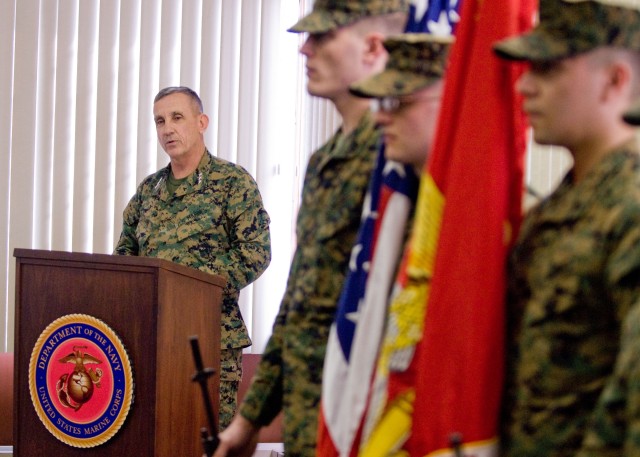Fort Meade bore witness to history last week as the Marine Corps took a big step into a brave new world.
In a ceremony Jan. 21 at the National Cryptologic Museum, Marines unfurled the colors of the service's newest operational component command, Marine Corps Forces, Cyberspace Command.
The event, which marked the Corps' protecting and defending the nation's cyber infrastructure, was witnessed by high-ranking service members ranging from senior noncommissioned officers to colonels and generals, and distinguished guests as retired Gen. Alfred M. Gray, served as the 29th commandant of the Corps.
The command joins a growing list of DoD agencies now tasked to support the government's Cyber Command effort.
Defending the nation's cyber infrastructure is now a crucial task for the military, said Lt. Gen. George Flynn, deputy commandant for combat development and integration who took command of the Marines' newest unit.
"The cyberspace domain is the newest and possibly the most complicated [one] we must now dominate," Flynn said. "If we are to be dominant on land at sea and in air, we must be dominant in cyber.
"We must be able to defend our cyber turf."
While the Marines' Cyberspace Command stood up last week, Flynn noted Marines are already deployed across the globe, aiding forward deployed units to protect the nation's cyberspace infrastructure.
"The bottom line here is the Marine Corps [Cyberspace Command], as part of our forces in readiness, is ready to operate in this domain," he said.
Defense Secretary Robert Gates created the Cyber Command last June with a call for the agency to be fully operational no later than October of this year. The agency was formed because the country's increasing dependency on cyberspace, alongside a growing array of cyber threats and vulnerabilities, adds a new element of risk to national security, according to a June article from American Forces Press Service. The creation of the new unit was welcomed by several of those who attended the event, including Gray.
"I think this it's a great step forward," he said. "There are plenty of challenges [ahead]. They'll be up for it."
The birth of the unit was similarly welcomed by Vice Adm. Bernard "Barry" McCullough, commander of the Navy's 10th fleet, which represents that Navy contribution to Cyber Command.
"I'm looking forward to working with the Marine Corps," McCullough said. "It's [an] exciting and challenging time."
Since last year, speculation has swirled in Maryland over whether the new agency and an expected influx of new jobs will come to Fort Meade. State leaders have been pitching Maryland as the perfect home for the agency.
Earlier this month, Gov. Martin O'Malley, accompanied by members of Maryland's congressional delegation, including Sens. Barbara A. Mikulski and Benjamin L. Cardin and Reps. C.A. "Dutch" Ruppersberger and Chris Van Hollen unveiled CyberMaryland.
The report takes an inventory of the state's assets to support a cyber-security industry as well as listing a 10-point strategy on how the state can further support cyber security.
"Maryland is poised to lead the nation's war on cyber crime," said O'Malley in a statement. "We have a duty to ensure the safety and security of every American citizen against this growing threat."
Mikulski, a member of the Senate Select Committee on Intelligence, similarly lauded Maryland's unique ability to combat cyber threats.
"The good news is Maryland has the knowledge, know-how, and can-do spirit to lead the way in cyber security," she said in a statement. "Our world-class facilities -- [National Institute of Standards and Technology ], and soon-to-be [Defense Information Systems Agency] -- combined with our vibrant and growing private sector and talented universities, uniquely position Maryland to lead the way in cyber security."
The Navy also formally establishes its Fleet Cyber Command/10th Fleet during a ceremony Friday, which will serve as another component of the Cyber Command.
Send comments or questions to amccombs@patuxent.com.


Social Sharing